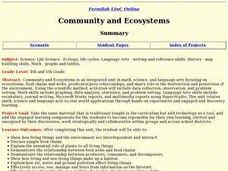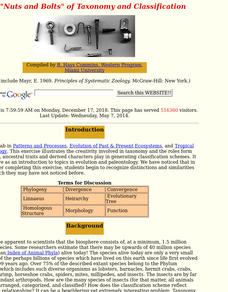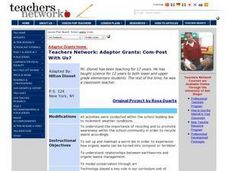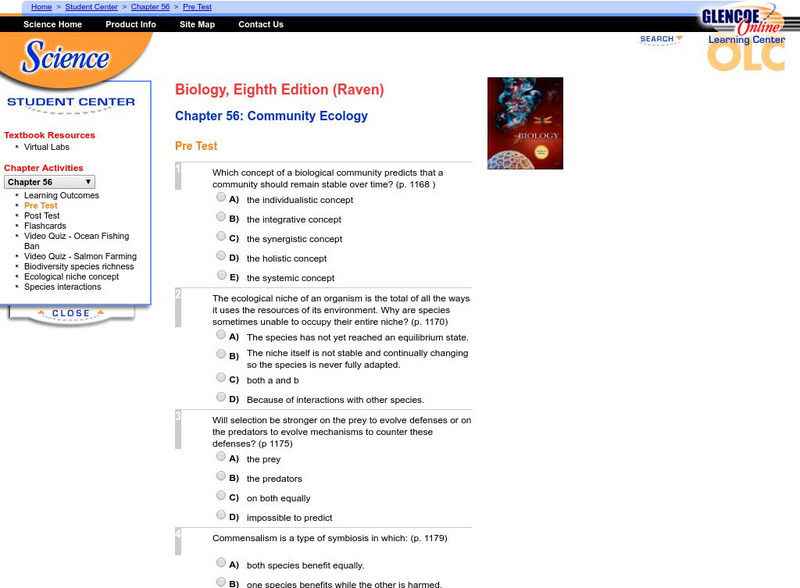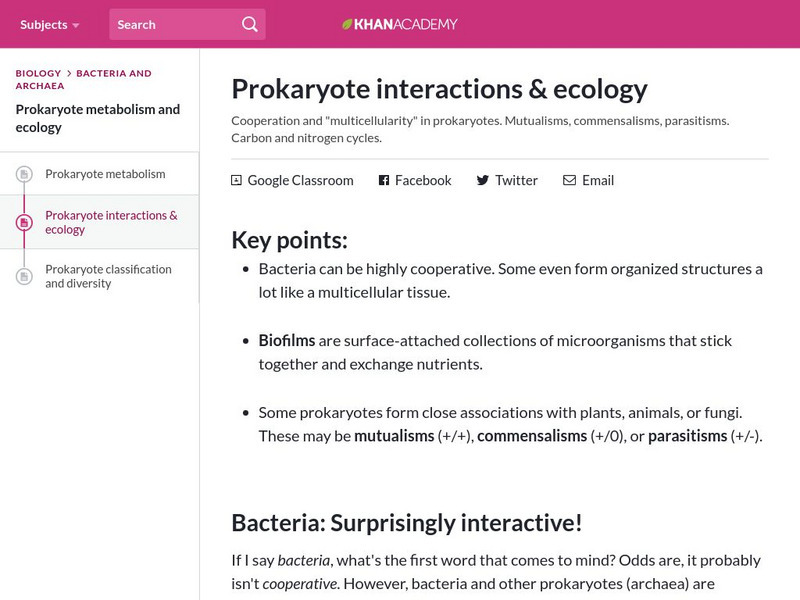Curated OER
Species and Specimens: Exploring Local Biodiversity
Students practice skills essential to all scientific investigation: carefully observing and collecting data. They become field biologists in a series of hands-on activities to collect and identify specimens, and survey and calculate the...
Curated OER
Kingdom: Fungi
The general characteristics that affect classification of fungi and other organisms in the domain Eukarya are detailed for the students on 12 attractive slides. Teachers can access individual slides to cover life cycles or...
Curated OER
Predator and Prey Game
Students explore the why the balance among producers, predators and prey is necessary in order for an ecosystem to be sustained over time. Through web games and activities, they discover how each component of the food chain works to...
Consortium for Ocean Science Exploration and Engagement (COSEE)
Arctic Smorgasbord
Though the walrus spends roughly one third of its time on land, it eats organisms that live on the bottom of the ocean. The first in a series of five, the lesson uses a variety of plant and animal cards to have scholars build an arctic...
Curated OER
Appearances Are Deceiving
Young scientists study creeks around their area to see how clean the water really is. One way to tell is by the invertebrate populations that are present. This lesson introduces a game which learners simulate a variety of species found...
Curated OER
Co-evolution of Plants and Pollinators
Young scholars explore biological evolution and natural selection and its evolutionary consequences. They also explore how organisms are interdependent on one another.
Curated OER
The Dirt on Worms!
Fourth graders make predictions, observe, collect and record data. They investigate several soil and worm websites. Finally, 4th graders write a letter to The President which defends earthworms by explaining their value to the United...
Curated OER
Community and Ecosystems
Learners complete a unit of lessons on ecosystems. They participate in online activities, create a diorama, write journal entries, and develop a Hyperstudio multimedia project on a selected ecosystem.
Curated OER
Greco-Roman Origin Myths
Students explore myths that explain the world, recognize some characters of Greco-Roman mythology and their symbols, and Make personal connections to the theme by writing and drawing a myth of their own.
Curated OER
Choose Your Defense: Spines, Vomit and Camouflage
Students investigate defensive mechanisms of insects and organisms. In this biology lesson, students draw imaginary caterpillars as well as imaginary parasites that will harm the caterpillar. Students utilize the Internet to...
Curated OER
The "Nuts and Bolts" of Taxonomy and Classification
Students develop classification scheme that meets the established rules of the Linnaean system. They write one page essay on classification choices.
Curated OER
Give Me Some Air!
Third graders examine how trees produce oxygen. They examine satellite images of the reservation they examining and interpret the number of trees on the land. They determine how natural resources should be used wisely.
Curated OER
Com-Post With Us?
Students discuss the importance of reducing, recycling and reusing materials to help the environment. As a class, they create a worm bin and observe how it turns material in to compost. They use the internet to research the...
CK-12 Foundation
Ck 12: Earth Science: Roles in an Ecosystem Study Guide
[Free Registration/Login may be required to access all resource tools.] This study guide summarizes key points about ecological roles and relationships. Includes a few questions to check for understanding.
National Geographic
National Geographic: Ecological Relationships
In this lesson, students learn about different types of ecological relationships, including symbiosis, mutualism, commensalism, and parasitism. Includes handouts and a vocabulary list with definitions.
Annenberg Foundation
Annenberg Learner: The Habitable Planet: Ecology Lab
Create the parameters of your own ecosystem by choosing which producers and consumers live there. Visualize how the food web operates and species populations change. This simulator mimics the food web within a typical ecosystem and gives...
CK-12 Foundation
Ck 12: Biology: Community Ecology Study Guide
This comprehensive study guide covers the main terms and concepts needed for a unit on community ecology.
McGraw Hill
Glencoe: Biology: Community Ecology
Find out what you know about community ecology by taking this interactive pretest.
Ohio State University
Ohio State University: Concepts of Plant Ecology
An advanced discussion of plant interactions and relationships. Energy flow, nutrient cycling and succession are discussed. Try the quiz to check your understanding.
Khan Academy
Khan Academy: Prokaryote Interactions & Ecology
Learn about cooperation and "multicellularity" in prokaryotes including mutualisms, commensalisms, parasitisms. Also find out the role of prokaryotes in the carbon and nitrogen cycles.
Untamed Science
Untamed Science: Ecology: The Study of Interactions
Learn about how ecology is simply the study of how and why organisms interact with their environments.
CK-12 Foundation
Ck 12: Biology: Symbiotic Relationships of Fungi
[Free Registration/Login may be required to access all resource tools.] Discusses parasitic and mutualistic relationships of fungi.
ArtsNow
Arts Now Learning: Using Tableau and Role Drama to Examine the Ecosystem [Pdf]
In this activity, 4th graders use tableaux to dramatize their roles in the food chain of an ecosystem. Next, they write in role arguing why they are important to the ecosystem. This is followed by a debate in the format of a Character...
Khan Academy
Khan Academy: Ecology: What Is an Ecosystem
Learn what an ecosystem is, how energy and matter move through ecosystems, and what makes an ecosystem stable.







